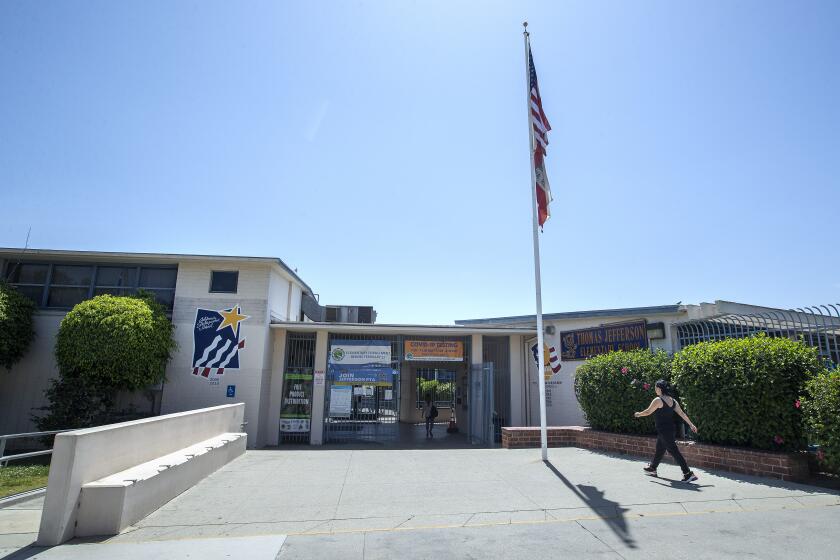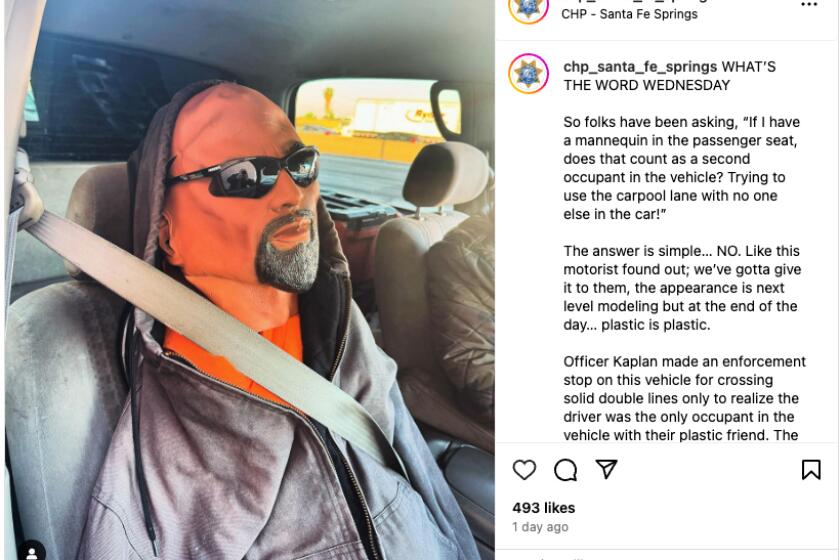A Mayor Riding Shotgun
Sometime before sunset, Mayor Frank Melton roared into a Kroger parking lot in the ungainly box-on-wheels that has become his signature vehicle.
Technically, it’s known as a “Mobile Command Center” -- a tricked-out RV that was once used for SWAT team operations. Tonight, Melton was riding shotgun in the thing, with cop cars in front and TV news vans behind.
As the entourage rolled to a stop, an onlooker asked the mayor what he was up to.
“I’m gettin’ ready,” he drawled, “to raise hell.”
Melton hopped out of his RV and sauntered into the store for some grape soda, a 9-millimeter Glock on his hip.
The soda was for the poor teenagers Melton would pick up a few minutes later and load into the back of the RV, giving them a chance to see a little excitement on a Wednesday evening. The Glock was in case the mayor ran into trouble on his primary mission: hunting down Vidal Sullivan, 33, a former murder suspect who was wanted on a kidnapping warrant.
“How you doin’, Frank?” the Kroger security guard asked.
“No bullet holes,” said the mayor, strolling toward the soda aisle. “You know how it goes.”
A Wild West-style manhunt, a rolling media spectacle, an improvised field trip for inner-city youth: It was, in many ways, a typical night on the town for Jackson’s mayor.
When he was overwhelmingly elected last summer, Melton -- a wealthy former TV executive who briefly headed the state narcotics bureau -- promised to do something dramatic about crime in this Deep South city, which has been battered by decades of white flight and black poverty.
His methods, and his message, have been anything but subtle. At his first City Council meeting, he passed out cowboy hats. Hours after his inauguration, he embarked on the first of his nighttime crime sweeps.
A year later, Jacksonians are used to the excursions. Melton leads them three times a week in a bulletproof vest, heading up roadblocks, conducting searches, looking for bad guys.
It is one of the more unusual displays of mayoral power in any American city, and it is certainly unlike anything anyone has seen in Mississippi’s capital. People here are so frustrated with crime that even some of Melton’s targets think he’s on to something.
“He’s all right,” said Jermaine Butler, a 34-year-old former gang member, just moments after Melton had confronted him and asked if he was holding drugs. “He’s just doing his job.”
Not everyone agrees. Civil rights leaders have accused Melton -- who is black -- of racial profiling and possibly violating due-process rights. The state attorney general has warned him to leave police work to sworn officers, concerned that his strong-arm tactics may jeopardize the admissibility of evidence gathered in searches.
Journalists have wondered why he has to keep that fancy, city-owned Mobile Command Center parked behind the gates of his house. One family accused Melton of harassing them on a late-night outing and recently filed an intent-to-sue notice against him and the city.
Some are still scratching their heads over the monthlong “state of emergency,” which ended this week. Melton had hoped to bring in the National Guard to fight crime, until the idea was dismissed by the governor’s office. Instead, the declaration mostly resulted in an earlier curfew for teenagers.
Jackson Police Cmdr. Tyrone Lewis says crime decreased during the state of emergency, although he could not produce statistics to back that up. Others, however, are wondering whether the broader strategy is doing any good: Recent police statistics show that major crimes are up about 15% over last year.
“All he wants to do is play cops -- just ignorant stuff,” said Hinds County Dist. Atty. Faye Peterson, who has been feuding publicly with Melton. “It looks good, but it’s not effective law enforcement.”
In Melton’s mind, Jackson -- a city of 180,000, 70% black and largely poor -- has failed to benefit from the safer, more bureaucratic approaches to criminal justice espoused by his predecessors.
“It’s time for something different,” he said. “I don’t know if it’s going to work out or not, but I have to make an effort.... I couldn’t live with myself as a human being if I didn’t try.”
The strategy is part of a bigger crusade that predates the election. Melton’s most cherished achievements as a private citizen were remarkable -- and similarly unorthodox -- acts of personal initiative. He points to the 55 boys he says he has taken out of the ghetto and raised in his gated mansion. And the 150 college tuitions he says he has funded through his foundation. And the 70-plus funerals.
Melton says he has known Sullivan, tonight’s fugitive, for nearly two decades. He met him the way he seems to have met half the poor black kids in Jackson -- by walking the streets as a sort of freelance father figure.
Melton says he has helped many of those kids. Sullivan, he says, “is one of the kids I missed.”
*
The caravan rumbled off the freeway in a whir of sirens and lights, and headed toward Wood Street, one of the most dangerous and desperate sections of Jackson. It is also the home of the Wood Street Players, the street gang that authorities think Sullivan belongs to.
Melton stopped to pick up five teenagers sitting on a picnic table in a park.
“Come get your asses over here and come to me,” he said.
Melton is a diminutive man with brushed-back hair and a thin, elegant mustache in the manner of Duke Ellington. He is also a swim instructor, and he tends to treat young men with a P.E. instructor’s mix of gruff authoritarianism and towel-snapping bonhomie.
Before becoming Jackson’s second black mayor, he earned a reputation as one of its most generous philanthropists, especially through his involvement with the YMCA. He was also known for his brash local TV editorial program, “The Bottom Line,” on the NBC television affiliate he once managed. Much of his commentary focused on getting tough on criminals.
He hugged the teens, and they piled into the back of the RV, grinning.
This group, Melton explained, was part of a new crew that was going to clean up Jackson. He said he had put more than 200 youths on the city payroll but many more, like these teens, were being paid out of his own pocket. He figured the work would keep them out of trouble.
“I put them in the business,” he said, as the RV rolled on. “It’s a beautiful story.”
Wood Street was lined with houses in need of paint; families crowded weary porches. The mayor hopped out with tonight’s mob -- police officers in flak jackets, journalists, TV cameramen, the teenage work crew.
Melton pointed to a weedy vacant lot. Mow that this week, he told the crew.
He walked into a house and was greeted by Ida Caldwell, a 75-year-old in a housecoat. A leak in her roof was rotting the ceiling. Fix that too, the mayor told the crew.
Melton told the woman someone would be coming around to take her down to the private University Club for supper.
“You just go eat whatever you want to eat and charge it to my account,” he said.
“Thank you, Frank.”
Melton walked back out to the street and turned his attention to finding his fugitive. He took aside a tattooed man with hard eyes and a white undershirt. They had a heated conversation some distance from the TV cameras. Then the man stomped off, agitated.
“That’s Maurice,” Melton said, describing him as another former murder suspect who had recently been acquitted. “I raised Maurice. He’ll deliver [Sullivan] to me.”
The denizens of Wood Street looked on as if this kind of thing happens all the time -- because it does.
*
Many Jacksonians are happy to see someone out in the streets where the trouble is.
“Oh, he’s great,” said Kimberly Green, 24, as she sat on a Wood Street porch. “The last mayor, he never came out and did stuff like this.”
“He’s got people’s attention about the crime issue,” said Jay Schimmel, the owner of Schimmel’s, a gourmet restaurant in the gentrifying Fondren District. “The normal way of doing things hasn’t yielded results.”
Jackson, Mississippi’s largest city, was burned by the Union Army in 1863, but it retains hints of its antebellum past: A plaque on the white-columned City Hall notes that it was built by slaves. These days, the central city is a sleepy place, and residents have been impatient with its modest strides toward urban renewal -- especially compared with other Southern cities like Birmingham, Ala., and Atlanta.
Civic leaders say some of the problem is the poor reputation the city earned during the civil rights era: This is where the Freedom Riders were arrested in 1961, and where, two years later, civil rights leader Medgar Evers was murdered by a white supremacist.
Jackson also has been hobbled by white flight since 1970, when the U.S. Supreme Court forced Mississippi schools to integrate. From 1980 to 2000, the white population in Jackson fell from 52% to 28%.
But during last year’s mayoral campaign, the main issue was crime. Incumbent Harvey Johnson Jr. -- Jackson’s first black mayor -- argued in the primary that it had decreased since he took office in 1997. The statistics largely bore him out.
For many voters, however, that wasn’t enough: According to the FBI, the violent crime rate in 2004 was still about 50% higher than the national average.
Melton charged that the old regime was painting an overly rosy picture of Jackson and pointed to vast tracts of urban blight.
It was a message that resonated with Jackson’s remaining whites, but also with inner-city blacks impatient over the continuing chaos in their neighborhoods. After defeating Johnson in the Democratic primary, Melton won the general election with 88% of the vote.
“Frank was really elected by the black have-nots,” said Mark McCreery, a businessman and political consultant who volunteered on the Melton campaign. “And what did he talk about? The fact that everybody should have the right to be safe in their homes and their neighborhoods.”
*
Now all the mayor had to do was wait for Maurice to deliver the fugitive. In the meantime, Melton pointed the caravan in the direction of the Christian Brotherhood public housing complex. Moms sat on stoops, men hung around in oversized football jerseys, and little kids rode bikes in circles. The sun had begun to sink.
The mayor jumped out of the RV, cops and cameras behind him, and walked toward a group of kids. They scattered.
“Oh, don’t go running,” he yelled after them. “You gonna talk to me.”
Melton homed in on one young man.
“What’s up, big guy?” Melton said, putting his arm around the boy. “Why are your eyes red? Just tell the truth. What was it? A blunt? About an hour ago? And you’re 18?”
The boy confessed to smoking marijuana. The mayor said he wouldn’t bust him, because he was being honest.
“If you want something to do, I can put you in Public Works,” Melton said. “I don’t want to lose you. Fair enough? If you ever need help with that problem, call me.”
Melton grew up in Houston’s historically black 5th Ward neighborhood. His mother and father raised him with a stern hand, keeping him out of trouble and setting him on a path to college. He worked his way up at a regional broadcasting company, becoming a manager and part owner. That career brought him to Jackson in the mid-1980s. It also made him wealthier than he could have ever imagined.
He says it is a sense of guilt that drives him to walk the streets in search of lost kids, to invite them to live in his mansion with the indoor swimming pool and home theater straight out of “MTV Cribs.”
He and his wife, Ellen, raised two children and sent them to college at the University of Texas. His wife lives in Texas too, at their second home. Melton spends most of his time these days in the Jackson mansion with seven young men he is raising. He calls each of them “son.”
“It’s just what I do best,” he said.
It was dark now, and still no Sullivan. So the caravan kept rolling. Melton smoked a cigarette and waved to the people ambling up the sidewalks. You watch how they respond to me, he said.
The pedestrians waved back, some enthusiastic, some bemused.
“Hey Frank!”
The mayor traded ribald jokes with an older woman looking for a boyfriend. He took a tattered business card from a man with chipped teeth who was looking for a job hanging drywall. On Lamar Street, he told a young man named Corey to stay out of trouble.
“I can’t search you in front of the media,” he said to Corey, as the cameras rolled. “They’ll make a big deal of it.”
He stopped another teenager ambling down the sidewalk in an oversized Tupac T-shirt. “Pull ya pants up on ya ass,” Melton said. “Get them pants up.”
He spent a half-hour sitting with homeless men in an empty lot downtown, asking them how he could help solve their problems. He stopped at the house of a single mother named Linda McCloud, who was worried about her teenage son.
“He wants to do right,” McCloud said. “But all of his friends are either on drugs or want to sell drugs.”
A TV reporter caught up with Melton and asked him for an update on the Sullivan manhunt. We’re still looking, the mayor told the viewers at home.
The caravan rolled on. The teenage work crew watched “Black Hawk Down” on the Mobile Command Center’s widescreen TV. The mayor stopped a few teenagers and sternly informed them they were out past curfew. Two of his officers arrested a man with a crack pipe in a motel parking lot.
But still no Sullivan.
It was almost 10 p.m. The mayor was ready to call it a night.
*
The morning after the manhunt, the Jackson Clarion-Ledger led its front page with a police story -- but it wasn’t about Vidal Sullivan’s capture.
Officers had arrested two other young men for failing to appear in court on armed robbery charges. One had been living at Melton’s house. Both had attended a barbecue there a few days before, their faces captured by news cameras.
This may be what worries Melton’s critics the most: his complicated personal ties to some of the troublemakers he has sworn to get off the streets.
Peterson, the district attorney, is still angry that she had to drop a murder case after court documents showed Melton was paying the rent of a former gang member who was her key witness. On Monday, a potential informant Melton had put up at a motel here disappeared after allegedly stealing a car.
“He’ll tell you he’s trying to save some of these kids, but they’re felons,” said City Councilman Marshand Crisler, a former Marine MP.
“He’s concentrating his efforts in the wrong places.”
Melton says he doesn’t like to give up on young men just because they have made mistakes. And, he notes, he is providing a paternal role, the kind that many people believe to be sorely lacking in black America.
“There comes a point,” he said, “where it takes a man to teach a boy to be a man.”
Vidal Sullivan was arrested three days later in a second manhunt. This one was conducted by five U.S. marshals.
More to Read
Start your day right
Sign up for Essential California for news, features and recommendations from the L.A. Times and beyond in your inbox six days a week.
You may occasionally receive promotional content from the Los Angeles Times.






